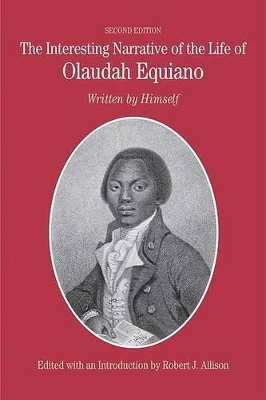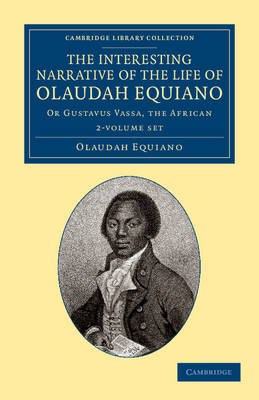Cambridge Library Collection - Slavery and Abolition
1 primary work • 4 total works
Volume 2
The Interesting Narrative of the Life of Olaudah Equiano
by Olaudah Equiano
Published 1 January 1969
The Interesting Narrative of the Life of Olaudah Equiano or Gustavus Vassa, the African. Written by Himself was the first work that influenced the nineteenth-century genre of slave narrative autobiographies. Written and published by Equiano, a former slave, it became a prototype for those that followed.
Kidnapped in Africa as a child, Equiano was transported to the Caribbean and then to Virginia, bought by a Quaker shipowner, and placed in service at sea. Aboard various American and British ships, he sailed throughout the world, and he continued to do so after having purchased his freedom in 1766. Once settled in London, he fought tirelessly to end slavery.
This edition of Equiano's Narrative places the text in the center of abolitionist activity in the late eighteenth century. Equiano knew many of the leading abolitionist figures of his time, and this edition allows readers to trace the common ideas and cross-influences in the works of the political and literary figures who fought for the end of slavery in America and England. The original 1789 text of the narrative has been used for the Broadview edition with Equiano's subsequent emendations included in the appendices.
Kidnapped in Africa as a child, Equiano was transported to the Caribbean and then to Virginia, bought by a Quaker shipowner, and placed in service at sea. Aboard various American and British ships, he sailed throughout the world, and he continued to do so after having purchased his freedom in 1766. Once settled in London, he fought tirelessly to end slavery.
This edition of Equiano's Narrative places the text in the center of abolitionist activity in the late eighteenth century. Equiano knew many of the leading abolitionist figures of his time, and this edition allows readers to trace the common ideas and cross-influences in the works of the political and literary figures who fought for the end of slavery in America and England. The original 1789 text of the narrative has been used for the Broadview edition with Equiano's subsequent emendations included in the appendices.
The Interesting Narrative of the Life of Olaudah Equiano 2 Volume Set
by Olaudah Equiano
Published 6 June 2013
Nigerian-born Olaudah Equiano (c.1745-97), also known as Gustavus Vassa, was sold into slavery as a child and endured the horrors of the transatlantic slave ships. He later worked on board Royal Navy vessels, receiving an education and converting to Christianity. Buying his freedom in 1766, he embarked on several voyages before settling in London, where he became involved in the causes of anti-slavery and the welfare of former slaves. Published in 1789, this successful two-volume autobiography boosted the abolitionist cause, providing a first-hand account of the experience of Africans on both sides of the Atlantic. It remains a classic work of black writing. Volume 1 covers Equiano's kidnapping and the Atlantic crossing, his adventures in the Royal Navy and his experiences in merchant trading in the Americas. Volume 2 recounts how Equiano achieved his freedom, his religious conversion, his experience of shipwreck in the West Indies and his life in England.
The Interesting Narrative of the Life of Olaudah Equiano: Volume 1
by Olaudah Equiano
Published 5 August 2014
Nigerian-born Olaudah Equiano (c.1745–97), also known as Gustavus Vassa, was sold into slavery as a child and endured the horrors of the transatlantic slave ships. He later worked on board Royal Navy vessels, receiving an education and converting to Christianity. Buying his freedom in 1766, he embarked on several voyages before settling in London, where he became involved in the causes of anti-slavery and the welfare of former slaves. Published in 1789, this successful two-volume autobiography boosted the abolitionist cause, providing a first-hand account of the experience of Africans on both sides of the Atlantic. An important document in the history of slavery and immigration, it remains a classic work of black writing. Volume 1 begins with Equiano's background and kidnapping, and the Atlantic crossing. He recounts his adventures in the Royal Navy during the Seven Years' War, and subsequent experiences of merchant trading in the Americas.
The Interesting Narrative of the Life of Olaudah Equiano: Volume 2
by Olaudah Equiano
Published 5 July 2014
Nigerian-born Olaudah Equiano (c.1745–97), also known as Gustavus Vassa, was sold into slavery as a child and endured the horrors of the transatlantic slave ships. He later worked on board Royal Navy vessels, receiving an education and converting to Christianity. Buying his freedom in 1766, he embarked on several voyages before settling in London, where he became involved in the causes of anti-slavery and the welfare of former slaves. Published in 1789, this successful two-volume autobiography boosted the abolitionist cause, providing a first-hand account of the experience of Africans on both sides of the Atlantic. An important document in the history of slavery and immigration, it remains a classic work of black writing. Volume 2 recounts how Equiano achieved his freedom, his conversion to Christianity, his experience of shipwreck in the West Indies, and his life in England.


